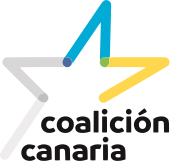Canarian Coalition Coalición Canaria | |
|---|---|
 | |
| Abbreviation | CC or CCa |
| General Secretary | Fernando Clavijo Batlle |
| Founded | February 1993 (as a coalition) May 2005 (as a party) |
| Headquarters | C/ Galcerán, 7-9 Edif. El Drago, Santa Cruz de Tenerife C/ Buenos Aires 24, Las Palmas de Gran Canaria |
| Ideology | |
| Political position | Centre[1] to centre-right[1][2][3] |
| National affiliation | Nationalist Coalition (1994–1999) European Coalition (1999–2004) Coalition for Europe (2009–2014) Coalition for Europe (2014–2019) CEUS (since 2019) |
| Regional affiliation | Agreement of Nationalist Unity (2006–2023) |
| European affiliation | European Democratic Party |
| Colours | White, blue, yellow (colours of the Canarian flag) |
| Congress of Deputies (Canarian seats) | 1 / 15 |
| Spanish Senate (Canarian seats) | 1 / 14 |
| European Parliament | 0 / 61 |
| Canarian Parliament | 20 / 70 |
| Island councils | 41 / 155 |
| Mayors (2023-2027)[4] | 21 / 88 |
| Municipal councils (2023-2027) | 303 / 1,402 |
| Website | |
| www | |
The Canarian Coalition (Spanish: Coalición Canaria) is a regionalist,[5][6] Canarian nationalist[7] federations of political parties in Spain operating in the Canary Islands. The party's aim is for greater autonomy for the islands but not independence.[8] Its position has been labeled as centrist[9] and centre-right.[1] The party governed the Canary Islands from 1993 to 2019; and currently since 2023 under Fernando Clavijo Batlle's leadership.
It usually negotiates with the plurality party at the Cortes to form a majority in exchange for resources for the islands. It also governs the local administrations of Tenerife, La Palma, and Fuerteventura, as well as having majority control in some of the town councils on the Canary Islands.
- ^ a b c "Appendix A3: Political Parties" (PDF). European Social Survey (8th ed.). 2016. Archived (PDF) from the original on 29 January 2018.
- ^ Rodríguez Borges, Rodrigo F. (2010). "Xenophobic discourse and agenda-setting. A case study in the press of the Canary Islands (Spain)" (PDF). Revista Latina de Comunicación Social (17–20): 222–230. doi:10.4185/RLCS-65-2010-895-222-230-EN (inactive 1 November 2024). Archived from the original (PDF) on 2012-04-26. Retrieved 2011-11-28.
{{cite journal}}: CS1 maint: DOI inactive as of November 2024 (link) - ^ Fernando León Solís (1 January 2003). Negotiating Spain and Catalonia: Competing Narratives of National Identity. Intellect Books. p. 127. ISBN 978-1-84150-077-5.
- ^ Lista de nuevos alcaldes 2023 en municipios españoles. Europa Press/EPDATA. 19 June 2023
- ^ John Coakley (13 September 2013). PATHWAYS FROM ETHNIC CONFLICT: Institutional Redesign in Divided Societies. Routledge. p. 73. ISBN 978-1-317-98847-2.
- ^ Stéphane Paquin; Guy LaChappelle (5 October 2005). Mastering Globalization: New Sub-States' Governance and Strategies. Routledge. p. 148. ISBN 978-1-134-27661-5.
- ^ Ari-Veikko Anttiroiko; Matti Mälkiä (2007). Encyclopedia of Digital Government. Idea Group Inc (IGI). p. 394. ISBN 978-1-59140-790-4.
- ^ Rodgers, Eamonn J. (1999). Encyclopedia of contemporary Spanish culture. New York: CRC. p. 442. ISBN 978-0-415-13187-2.
- ^ "Los centristas de CC reconocen que la dirección en Tenerife no ha tenido buena voluntad para cumplir acuerdos". 6 April 2010.